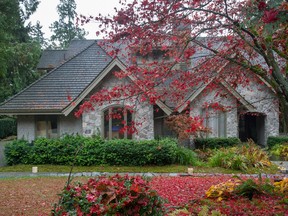The ruling is the latest setback in efforts by the wife of a convicted financial swindler to stop the forfeiture of a luxury property in West Vancouver and the forfeiture of proceeds from the sale of a luxury home in Whistler, both linked to a $325 million stock fraud.

.
A British Columbia Supreme Court has rejected a lawsuit to strike down a provision in federal law that allows a property forfeiture order in another country to be recognized in Canada.
Announcement 2
.
The ruling is the latest setback in efforts by the wife of a convicted financial swindler to stop the forfeiture of a luxury property in West Vancouver and the forfeiture of proceeds from the sale of a luxury home in Whistler, both linked to a $325 million stock fraud.
.
The value of the West Vancouver home and proceeds from the sale of the Whistler home total $7.2 million.
.
Delia Mulholland and two companies that own the properties argued that a provision of a law dealing with cooperation in criminal matters between Canada and other countries should be struck down as unconstitutional because it improperly allows for a central jurisdiction of British Columbia courts and the minister of federal justice on asset forfeiture will be decided by the United States.
Announcement 3
.
Canada’s Attorney General disagreed, saying the focus of federal law is jurisdiction over the forfeiture of proceeds of crime for the purpose of quelling international crime.
The BC Supreme Court agreed in a ruling in late September.
In a 28-page decision, British Columbia Supreme Court Justice Jeanne E. Watchuk wrote that the federal government in reviewing and approving a treaty application under the forfeiture provision is not resolving a private dispute but rather engaging in a mutually beneficial public decision for Canada. and the United States
“The Minister is participating in a government-to-government process designed to enable Canada to respond on a treaty basis to requests for assistance from a foreign jurisdiction in enforcing a confiscation order issued by a court in that jurisdiction in relation to the proceeds of crime derived from the commission of a criminal offense for which the defendant was convicted,” Watchuk noted.
Announcement 4
.
In May 2016, Gregg Mulholland pleaded guilty in the US to money laundering conspiracy for fraudulently manipulating the shares of more than 40 publicly traded US companies and then laundering more than US$250 million in fraudulent proceeds to through at least five offshore law firms.
In February 2017, Mulholland, a dual Canadian-American citizen, was sentenced to 12 years in prison
In 2019, the US forfeiture order was recognized as enforceable in British Columbia following a request to the Canadian government from the US government.
In 2020, the BC Supreme Court also rejected a lawsuit by Delia Mulholland for wide disclosure of documents between the US and Canadian governments related to the forfeiture order, as part of an effort to nullify the forfeiture order as a process abuse.
ad 5
.
One of the properties Gregg Mulholland has agreed to forfeit is 3630 Mathers Ave. in West Vancouver. It was purchased in its entirety without a mortgage in 2014 for $4.85 million, according to BC Land Title records. The 6,000-square-foot, five-bedroom, five-bathroom home on a quarter-acre with a pool is now valued at $5.96 million, according to BC Appraisal Authority records.
The Whistler estate was sold and proceeds of about $1.3 million were placed in trust in 2016, according to a British Columbia Supreme Court lawsuit filed by the U.S. Securities and Exchange Commission to recover a fine owed. by Mulholland in a different stock fraud scheme.
In 2015, the US SEC filed a certificate of pending litigation on the Mathers Avenue home, which remains in effect and is an obstacle to the sale of the property.
ad 6
.
Mulholland’s properties were among those previously examined by Postmedia in a real estate money laundering analysis.
In the 2020 court action challenging the recognition of the US forfeiture order, Delia Mulholland and the other parties asserted that her husband had never claimed any interest in the West Vancouver and Whistler properties.
The judge in that case, British Columbia Supreme Court Justice James Williams, noted that the documents he reviewed, including the asset forfeiture agreement, convinced him that when the US issued its order, it was acting on the basis that Gregg Mulholland had an interest in the properties. and he was agreeing to give up his interest.

